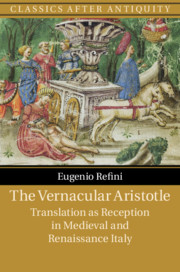Book contents
- The Vernacular Aristotle
- Classics after Antiquity
- The Vernacular Aristotle
- Copyright page
- Dedication
- Contents
- Figures
- Series Editors’ Preface
- Acknowledgements
- Notes on the Text
- Introduction
- Chapter 1 Taming the Philosopher
- Chapter 2 The Master of Those Who Know (and Those Who Don’t)
- Chapter 3 Family BusinessReadying the Ethics for the Layman
- Chapter 4 The Philosopher, the Humanist, the Translator and the Reader
- Chapter 5 Abridging the Philosopher(s)
- Conclusion
- Bibliography
- Index
Introduction
Published online by Cambridge University Press: 10 February 2020
- The Vernacular Aristotle
- Classics after Antiquity
- The Vernacular Aristotle
- Copyright page
- Dedication
- Contents
- Figures
- Series Editors’ Preface
- Acknowledgements
- Notes on the Text
- Introduction
- Chapter 1 Taming the Philosopher
- Chapter 2 The Master of Those Who Know (and Those Who Don’t)
- Chapter 3 Family BusinessReadying the Ethics for the Layman
- Chapter 4 The Philosopher, the Humanist, the Translator and the Reader
- Chapter 5 Abridging the Philosopher(s)
- Conclusion
- Bibliography
- Index
Summary
The introduction discusses the interrelated notions of translation and reception and introduces the main topic of the book: namely, the ways in which vernacular readers appropriated the legacy of Aristotle in Italy between 1250 and 1500. Given the deep-rooted and widespread presence of Aristotle in medieval and Renaissance culture, the vernacular reception of the philosopher’s works offers a productive lens through which to reconsider the proactive role of translation in the construction and refinement of communicative tools able to disseminate the philosophical tradition among wider communities of readers. As such, the introduction reflects on the cultural implications of the theory and practice of vernacular translation in the period, arguing that its function is better understood when considered as part of a wide-ranging reception process involving not only the translators, but also their readers, who, in various ways, contribute actively to the process itself.
Keywords
- Type
- Chapter
- Information
- The Vernacular AristotleTranslation as Reception in Medieval and Renaissance Italy, pp. 1 - 16Publisher: Cambridge University PressPrint publication year: 2020

